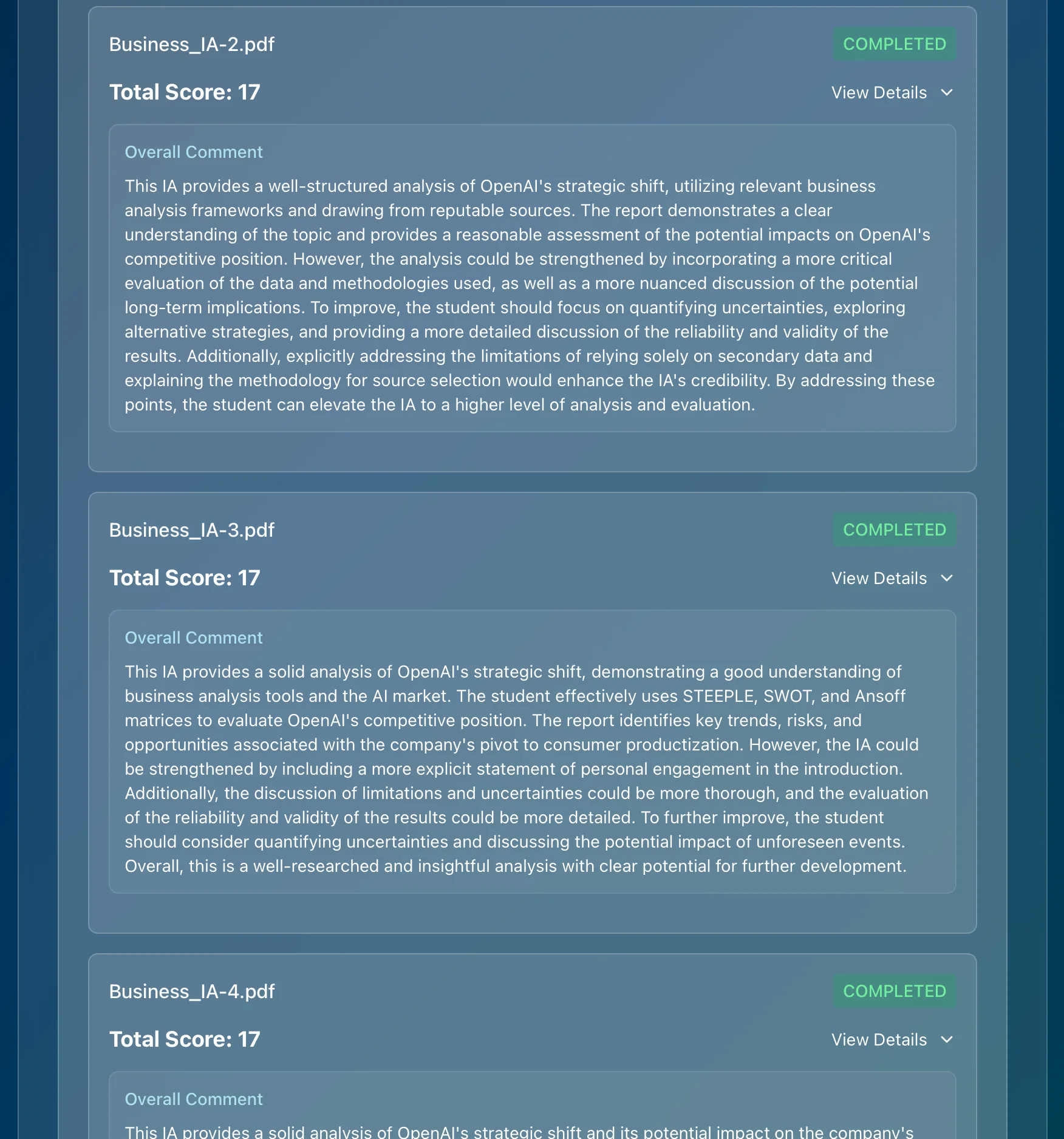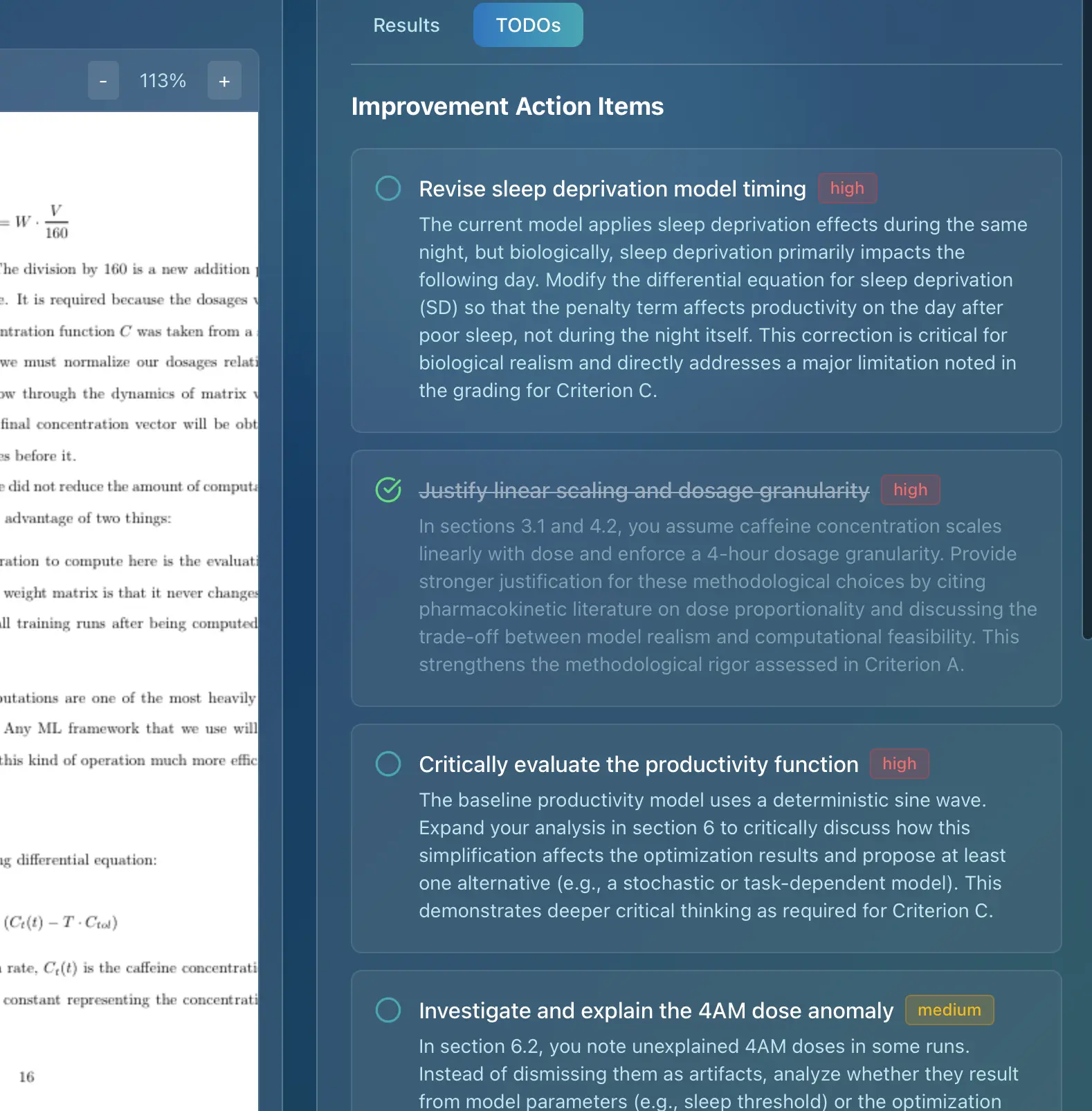Creating Study Schedules That Actually Work for IB
Are you an IB student feeling overwhelmed by the sheer volume of coursework, Internal Assessments (IAs), and looming exams? Creating a study schedule that actually works is crucial for success in the International Baccalaureate program. This guide will provide you with practical, actionable strategies to design a personalized schedule that maximizes your learning, minimizes stress, and helps you achieve your academic goals. We'll cover everything from understanding your learning style to leveraging technology to stay on track. Let's dive in and create a study schedule that sets you up for IB success!
Why a Study Schedule is Essential for IB Success
The International Baccalaureate Diploma Programme (IBDP) is notoriously demanding. It requires you to juggle multiple subjects, each with its own unique requirements, Internal Assessments, and external exams. Without a well-structured study schedule, it's easy to fall behind, feel overwhelmed, and ultimately underperform. A solid schedule provides:
- Structure and Organization: A clear plan helps you organize your time and prioritize tasks.
- Reduced Stress: Knowing what you need to do and when reduces anxiety and promotes a sense of control.
- Improved Time Management: You'll learn to allocate time effectively, avoiding last-minute cramming.
- Balanced Learning: A schedule ensures you dedicate sufficient time to each subject, preventing imbalances.
- Increased Productivity: Focused study sessions lead to better retention and understanding.
Struggling with IB Assessments?
Get instant, detailed feedback on your work with AI that understands IB criteria.

Step-by-Step Guide to Building Your IB Study Schedule
Creating an effective study schedule is a personalized process. Here's a step-by-step guide to help you design a schedule that works for you:
1. Assess Your Current Situation
- Identify Your Subjects and Requirements: List all your IB subjects, IAs, Extended Essay (EE), Theory of Knowledge (TOK), and any other academic commitments.
- Evaluate Your Strengths and Weaknesses: Honestly assess your proficiency in each subject. Where do you excel? Where do you struggle? This will help you allocate more time to challenging areas.
- Track Your Current Time Usage: For a week, keep a detailed log of how you spend your time. This will reveal time-wasting habits and highlight available study slots.
2. Set Realistic Goals
- Define Your Target Grades: What are your desired grades in each subject? Use past papers and mark schemes to understand the requirements for each grade level. For example, if you're aiming for a 7 in IB Math AA HL, research what's required to achieve that score.
- Break Down Large Tasks: Divide IAs, the EE, and TOK essay into smaller, manageable steps with deadlines for each.
- Set Daily and Weekly Goals: Create specific, measurable, achievable, relevant, and time-bound (SMART) goals for each day and week.
3. Choose Your Scheduling Method
- Digital Calendars (Google Calendar, Outlook Calendar): Offer flexibility, reminders, and easy rescheduling.
- Physical Planners: Provide a tangible overview of your schedule and allow for handwritten notes.
- Apps (Trello, Asana, Notion): Offer project management features, task tracking, and collaboration tools.
- Spreadsheets (Excel, Google Sheets): Allow for detailed organization and data analysis.
Choose the method that best suits your learning style and organizational preferences.
4. Allocate Time for Each Subject
- Prioritize Challenging Subjects: Dedicate more time to subjects where you struggle or that have a heavier workload.
- Allocate Time for IAs and EE: Schedule specific blocks of time for research, writing, and editing.
- Include Review Sessions: Regularly review previously learned material to reinforce your understanding.
- Factor in Breaks: Short, frequent breaks are essential for maintaining focus and preventing burnout. The Pomodoro Technique (25 minutes of work followed by a 5-minute break) can be highly effective.
Example Schedule Snippet:
- Monday:
- 9:00 AM - 10:30 AM: IB Physics HL - Review Chapter 3 (Waves)
- 10:30 AM - 10:45 AM: Break
- 10:45 AM - 12:15 PM: IB English Literature SL - Read and analyze "Hamlet" Act 1
- 12:15 PM - 1:15 PM: Lunch
- 1:15 PM - 2:45 PM: IB History HL - Work on IA research (primary source analysis)
- 2:45 PM - 3:00 PM: Break
- 3:00 PM - 4:30 PM: IB Math AA SL - Practice problems from Chapter 5 (Calculus)
5. Incorporate Flexibility
- Build in Buffer Time: Leave some unscheduled time each day to accommodate unexpected events or catch up on missed tasks.
- Review and Adjust Regularly: Your schedule is not set in stone. Review it weekly and make adjustments as needed based on your progress and changing priorities.
- Be Prepared to Adapt: Life happens. Don't get discouraged if you occasionally deviate from your schedule. Simply get back on track as soon as possible.
6. Prioritize Self-Care
- Schedule Time for Sleep: Aim for 7-8 hours of sleep per night. Sleep is crucial for memory consolidation and cognitive function.
- Include Exercise: Regular physical activity reduces stress and improves focus.
- Make Time for Hobbies and Social Activities: Don't let IB consume your entire life. Dedicate time to activities you enjoy and spend time with friends and family.
- Practice Mindfulness: Techniques like meditation and deep breathing can help you manage stress and improve concentration.
Common Challenges/Mistakes and How to Avoid Them
- Unrealistic Expectations: Setting overly ambitious goals can lead to discouragement and burnout. Be realistic about what you can achieve in a given timeframe.
- Procrastination: Break down large tasks into smaller, more manageable steps to overcome procrastination. Use techniques like the "two-minute rule" (if a task takes less than two minutes, do it immediately).
- Perfectionism: Striving for perfection can lead to analysis paralysis and wasted time. Focus on progress, not perfection.
- Lack of Flexibility: A rigid schedule can be difficult to maintain. Build in buffer time and be prepared to adapt to unexpected events.
- Ignoring Self-Care: Neglecting sleep, exercise, and social activities can lead to burnout and decreased performance. Prioritize self-care as an essential part of your study schedule.
- Not Seeking Help: Don't be afraid to ask for help from teachers, tutors, or classmates when you're struggling.
Pro Tip: Get AI-Powered Grading
Stop second-guessing your grades. Get instant feedback aligned with official IB rubrics.

Advanced Tips/Strategies for IB Study Schedule Success
- Use Active Recall: Instead of passively rereading notes, actively test yourself on the material. Use flashcards, practice questions, or teach the material to someone else.
- Spaced Repetition: Review material at increasing intervals to improve long-term retention. Use spaced repetition software like Anki.
- Interleaving: Mix up different subjects or topics during your study sessions to improve understanding and retention.
- Find a Study Buddy: Studying with a friend can provide motivation, accountability, and different perspectives.
- Create a Dedicated Study Space: Choose a quiet, distraction-free environment where you can focus on your work.
- Utilize Past Papers: Practice with past IB exam papers to familiarize yourself with the format, question types, and marking schemes.
- Master the IB Command Terms: Understand the meaning of each command term (e.g., "analyze," "evaluate," "discuss") to answer exam questions effectively.
Technology and Modern Assessment in IB
Technology is transforming the way IB students learn and are assessed. Online resources, collaborative tools, and AI-powered platforms are becoming increasingly prevalent. One significant advancement is the use of AI in grading and feedback.
Marksy is a leading AI grading assistant specifically designed for the International Baccalaureate. It helps teachers provide instant, accurate, and detailed feedback on student work based on official IB rubrics. This means students receive consistent, criterion-by-criterion feedback, allowing them to understand exactly how to improve their work.
AI tools like Marksy use official IB criteria to ensure accuracy and fairness in assessment. For teachers, this translates to significant time savings, allowing them to focus on personalized instruction and student support. For students, it means clearer guidance on how to meet the IB's rigorous standards. Using AI to streamline grading processes helps maintain assessment quality while freeing up valuable time for both educators and learners.
Conclusion: Your Path to IB Success Starts Now
Creating a study schedule that actually works for IB is an investment in your academic success and overall well-being. By following the steps outlined in this guide, you can design a personalized schedule that maximizes your learning, minimizes stress, and helps you achieve your goals. Remember to be realistic, flexible, and prioritize self-care.
Ready to take your IB studies to the next level? Try Marksy for free and experience the power of AI-driven feedback to improve your scores and streamline your learning process. Sign up for a free trial today and see how Marksy can help you achieve your full potential in the International Baccalaureate program!